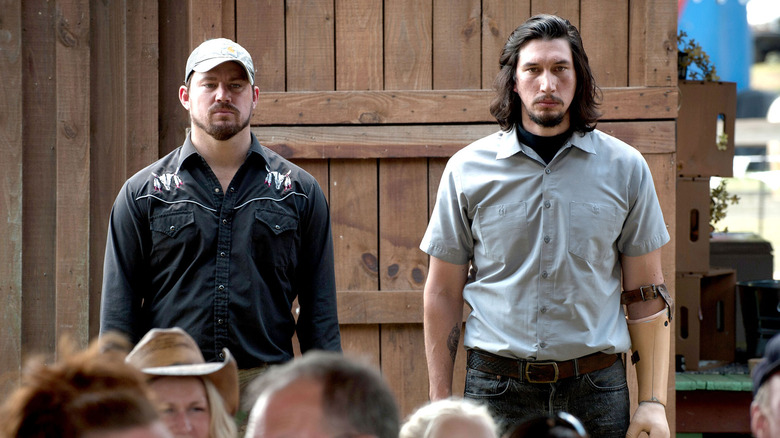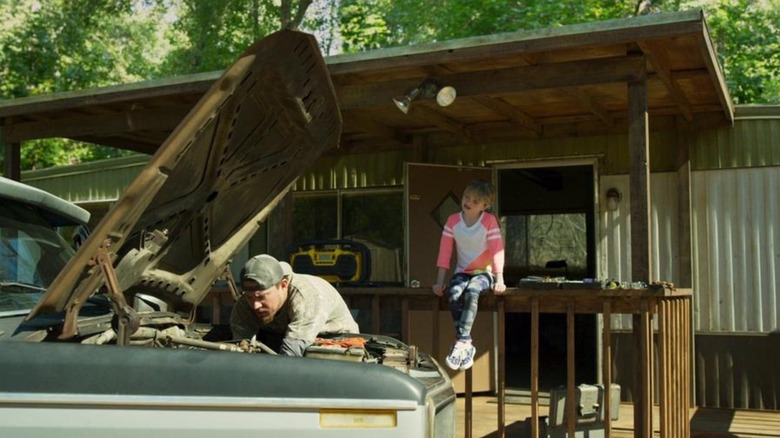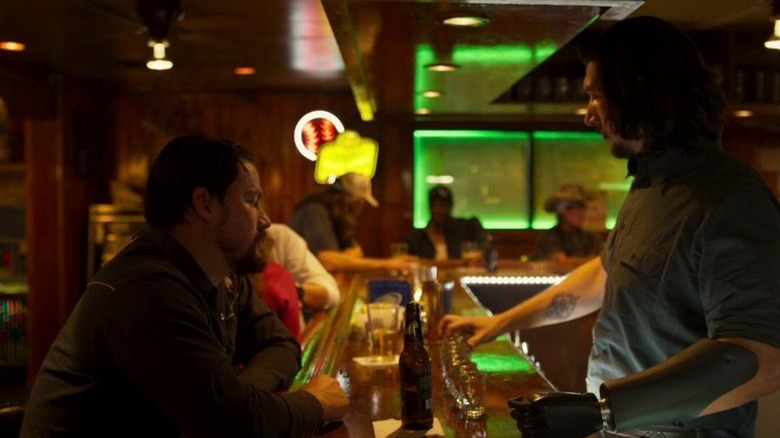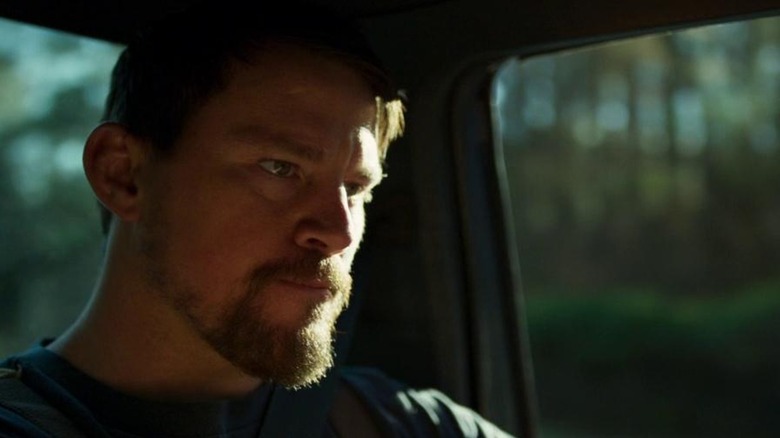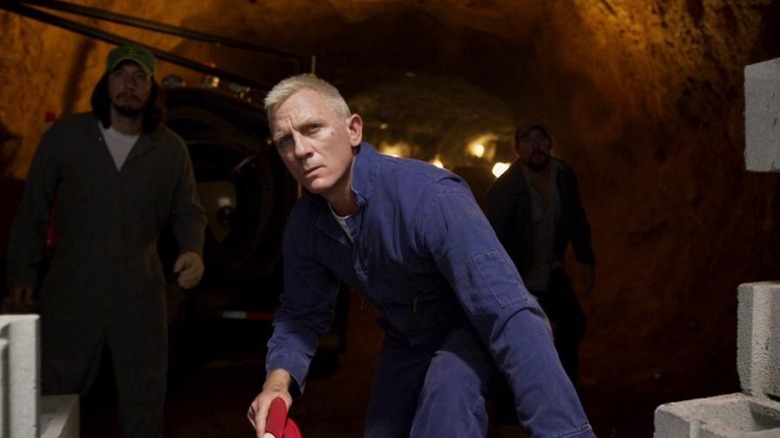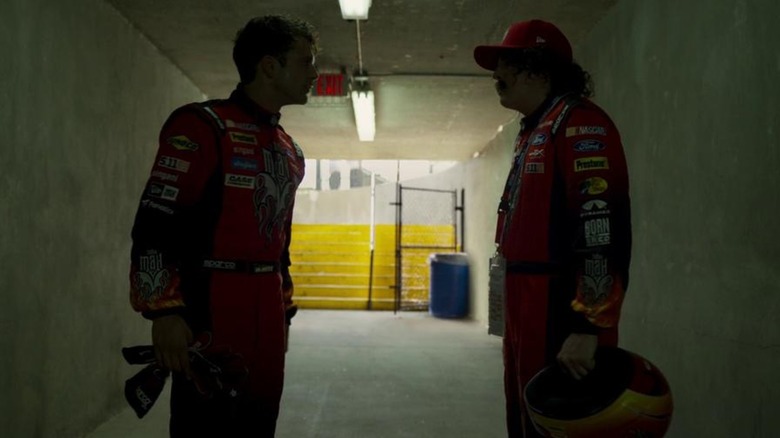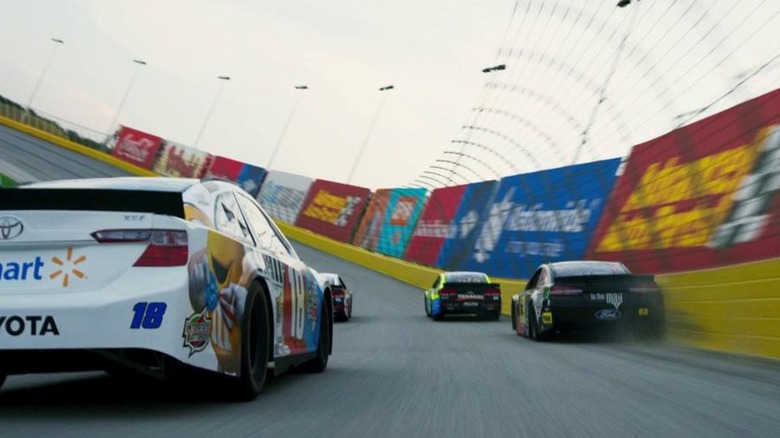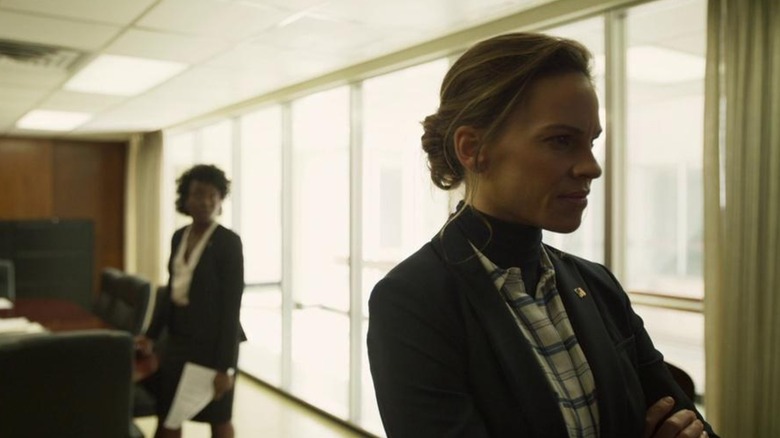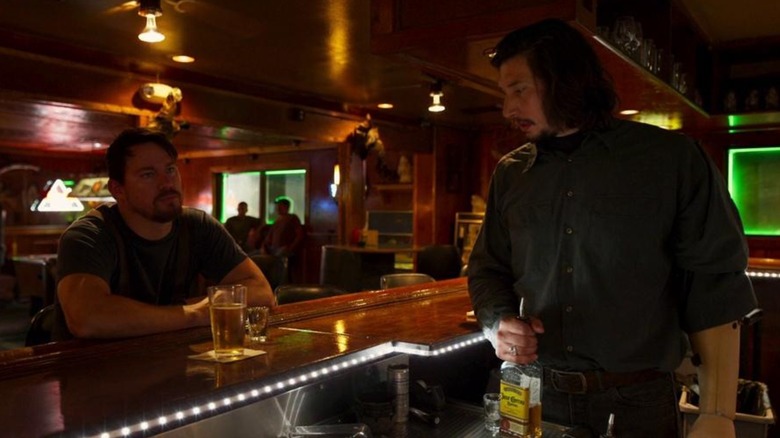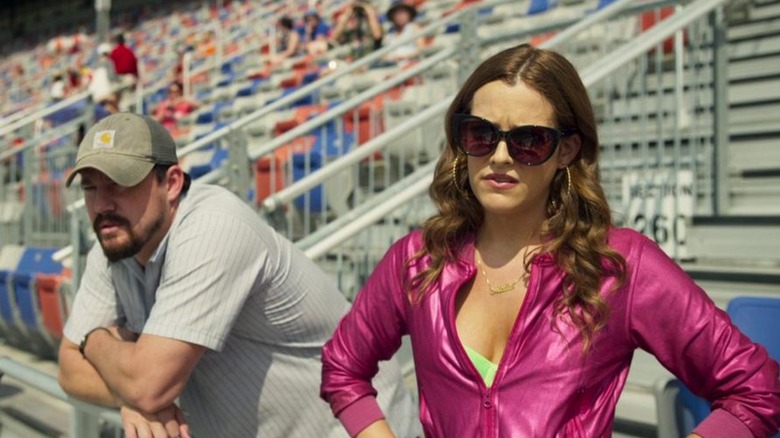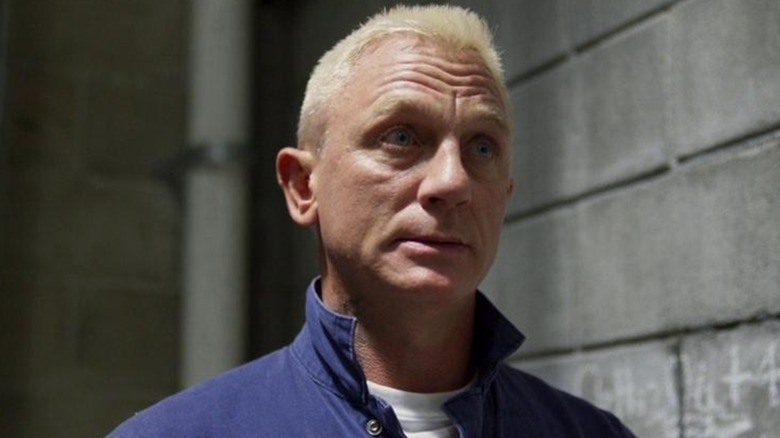The Ending Of Logan Lucky Explained
When you bring together Channing Tatum and Steven Soderbergh, you're inevitably going to get a great movie. All the lawbreakers in the house are thinking of "Magic Mike" right now, but, in between the second and third movies in that franchise, one of Soderbergh's all-time best films snuck its way into theaters.
"Logan Lucky" is set in West Virginia and follows Jimmy Logan (Channing Tatum), a construction worker doing his best to co-parent his young daughter with his ex-wife. Jimmy's a warm-hearted guy and a genuinely good dad, but one thing leads to another and he needs to rob a bank so he can stay in his daughter's life. If you liked Soderbergh's "Ocean's 11," then you'll be thrilled to ride along as Jimmy puts together a team, develops an overly complicated plan, and powers through all the speedbumps that life throws his way.
The characters at the heart of the story are more motivated by care for each other than pure greed, but don't be fooled: "Logan Lucky" is a heist movie through and through, complete with a wild twist ending and a pseudo cliffhanger that we're here to help you make sense of.
What you need to remember about the plot of Logan Lucky
We meet Jimmy Logan (Channing Tatum) as he's working on a car with the help of his young daughter Sadie (Farrah Mackenzie). Jimmy shares custody of Sadie with his ex-wife Bobbie Jo Chapman (Katie Holmes), and it's immediately obvious that the two of them are having some disagreements about how to co-parent. Jimmy learns that Bobbie Jo wants to move out of state with her new husband and stepchildren, and that same day he loses his job at a construction site beneath the Charlotte Motor Speedway.
Without any way to pay for a lawyer to fight for his daughter, or any funds to move himself closer to her, Jimmy starts dreaming up a plan to rob the Speedway during one of the smallest events it hosts each year. Jimmy brings his brother Clyde (Adam Driver) and sister Mellie (Riley Keough) into the scheme, and together they start putting together a plan to sneak into the construction site and blow open the Speedway's on-site bank vault.
To get the job done, the Logans recruit an experienced bank robber named Joe Bang (Daniel Craig). Joe is currently serving time in jail, so the Logans plan to break him out the day of the race, rob the Speedway, and then sneak him back into his cell. Clyde gets himself thrown in jail to help with Joe's escape, and everyone prepares for the day of the race.
What happened at the end of Logan Lucky
Jimmy's plan goes pear-shaped when the construction site manages to finish early. He needs to move the robbery up by a week, meaning the gang will be making their move during the Coca-Cola 600, the biggest race of the year.
During the prison break, bank robbery, and prison re-entry, the gang runs into more than a few snags, but they ultimately get away with the money. Jimmy leaves their giant bags of cash in a car at a gas station and calls in a report to the FBI. Over the ensuing months, the FBI investigates how the robbery took place and why the robbers returned the money. They find no answers, and the Speedway doesn't press the issue because the insurance company compensated them.
Clyde gets out of jail and goes back to his old job at a bar. When Joe eventually gets out, he confronts Clyde about why Jimmy returned the money. Clyde, wearing a fancy new prosthetic arm, refuses to tell him, but later Joe finds bags of money buried on his property. It turns out that Jimmy stole more money than he let on, and he only returned a portion of it. In the movie's last scene, the Logans are all together at the bar along with Joe and some of their other friends, and sitting in the back of the room is FBI Agent Sarah Grayson (Hilary Swank), refusing to give up the case.
How did Jimmy's real plan change the ending?
All the best heist movies have a great twist, and the ending of "Logan Lucky" doesn't disappoint on that front. The film mostly follows Jimmy, but when it comes to the ending, the audience is put more into the shoes of Joe Bang. When Jimmy calls the FBI, we don't know why he's doing it, and as the movie follows Joe on his exit from prison, it really seems like the Logans had him do the robbery for nothing. The reveal that Jimmy actually made sure to get everyone a portion of the money hits at the same moment that Joe finds the bags of money in his backyard.
The final move of Jimmy's plan calls back to a list of bank robbery rules he made at the beginning of the movie, which included not getting too greedy. Throughout the movie there are moments where it seems like Jimmy might be losing sight of his initial motivation — which is staying with his daughter — and becoming fixated on simply stealing the money. The big twist in his plan proves that in all those "moments of doubt" he really was committed to his family above all else. In a weird way, Jimmy's robbery only works because he didn't really want the money in the first place.
Why did the Logans keep everyone out of the loop?
Jimmy and his siblings knew that they needed Joe and the other Bang brothers to get their robbery done, but that doesn't mean the Logans trusted them. In the very first scene where Jimmy and Clyde meet Joe, it's obvious they feel a little reluctant to bring him into the plan. The biggest problem with Joe, from Jimmy's perspective, is that he's obviously self-motivated. Jimmy's motivations for the robbery are somewhat altruistic, but Joe would definitely want to get his hands on as much money as possible. If he knew the whole plan, he might break the "don't get greedy" rule and get the entire group caught.
The other problem with bringing Joe into the plan is that his connection to the prison is a liability. If Warden Burns (Dwight Yoakam) discovered their plan at any point, he could stop them from getting the money. At the same time, Jimmy relied on Warden Burns protecting his reputation by refusing to cooperate with the FBI by admitting that there'd been a riot, and potential escape, at his prison. Jimmy's plan couldn't work without Joe, but Joe could have ruined everything by letting something slip to Burns. Because of that, the Logans had to keep Joe in the dark and create a great twist ending in the process.
How did Dayton White change the ending?
Dayton White (Sebastian Stan) doesn't know the Logans, but he's almost single-handedly responsible for their robbery succeeding. Dayton is a professional NASCAR driver who thinks of his body as a computer's operating system and imagines his food and daily routines as software. When his boss Max Chilblain (Seth MacFarlane) forces Dayton to drink an energy drink before a race for a publicity stunt, Dayton's operating system, and his car, violently crash.
It just so happens that days before the big race, Max had a chance encounter with the Logans at their bar. They didn't part on good terms, largely because Clyde ended up setting Max's car on fire. After Dayton's disastrous race, Max is screaming at him in a hallway when he spots Clyde fleeing the Speedway. In a panic, Clyde breaks Max's nose and runs. When the FBI asks Max about what happened at the race, he tells them all about Clyde, but they don't believe him. Why? Dayton denied the whole story.
All of this might seem like a lot of random on-screen action to help set a deus ex ending. Sure, it's convenient that everything lines up just right for the Logans to get away with their crime, but that's not why Dayton and Max are in the story. Their inclusion is all about emphasizing the moral logic of the movie. The robbers who are motivated by care for their own friends and family get away with stolen money, and the honest businessman who treats everyone around him like dirt gets a broken nose and a healthy dose of humiliation.
What's the significance of the Speedway's insurance payout?
The FBI ultimately gives up on the Speedway investigation, even though one of its agents has a strong hunch that she knows who committed the robbery. Unfortunately for Agent Grayson, the Logans left behind very little evidence of their crime, and they have an extremely powerful ally on their side: the Charlotte Motor Speedway.
Agent Grayson becomes extremely frustrated when she learns that the Speedway's president is not really interested in catching the thieves. Part of Jimmy's plan involved crashing the Speedway's internet connection on the day of the race, forcing people to pay for tickets, drinks, and food with cash and flooding the vault with money to take. Because the Speedway was operating entirely on cash that day, it didn't have a reliable way of knowing how much money was in the vault when it was robbed. After some of the money was returned, the Speedway and its insurance provider had to negotiate over the amount that was still missing and needed to be paid out. The Speedway's president implies that he's very happy with how the negotiations went, and now he has no interest in catching the thieves and fact-checking the numbers.
This is either another incredible coincidence or another moment where Jimmy has exhibited almost supernatural forethought with his plan. Either way, the Speedway's position on the robbery once again reflects the morality of the movie as a whole: Jimmy knows that as long as he doesn't get greedy, the greed of others will help him get away with his plan.
Does Agent Grayson's presence change the ending?
"Logan Lucky" almost has an unambiguously happy ending. Jimmy gets to be close to his daughter, and it looks like he's started a new relationship with his old classmate Sylvia Harrison (Katherine Waterston). Clyde gets a new arm, and presumably neither he nor Mellie have to worry about money anytime soon. Joe Bang is clearly happy, and we have to at least hope he shared some of the money with his brothers. Everyone got away with it — but one tenacious FBI agent isn't giving up the case.
Agent Grayson never had a single piece of evidence pinning Joe, Jimmy, or the other Logans to the robbery, but she had a strong feeling they were involved with the case. Their names came up at the Speedway construction site, at the prison, and in Max Chilblain's story. Agent Grayson argued against closing the case, but she was ordered to wrap it up. Thanks to that order, it's safe to assume that the Logans won't end up going to jail at any point. So, even though she's lurking at the end, Grayson's presence doesn't change anything.
What's interesting is that Agent Grayson and Clyde have a bit of a moment in the movie's final scene that could be the start of a new romance if it were at the beginning of a different movie. Maybe Grayson will get to experience the classic "agent falls for their target" plotline with Clyde and eventually catch the Charlotte Motor Speedway robbers that way, but that story would have to take place in a second movie.
What's next for Jimmy and the other Logans?
The ending of "Logan Lucky" does a great job of leaving all our characters in the midst of a brand new status quo. However, oddly enough considering what they achieved, the lives of the main characters at the end of the movie aren't all that different from what they were like at the beginning. Nobody buys a giant mansion or a fancy new car. This shouldn't come as a shock — by the end of the movie, we're supposed to understand that these guys aren't chasing money because they want to experience the lifestyle of the rich and famous.
Jimmy's motives are as pure as they come — he just wanted to keep his daughter close, and his siblings simply wanted to support him in that endeavor. Yes, Joe might have been in it for the money to a certain degree, but we also get the sense that he's simply so delighted by the outrageousness of Jimmy's plan that he can't help but take part in it. For him, it's more about the journey than the destination. All throughout the movie, the characters are really just fighting to hold onto the lives they've always known, and their efforts get rewarded.
What was the real meaning of the Logan curse?
The very first time we see Clyde, he's talking about the Logan family curse. According to him, the entire family is destined to face tragedy and to constantly fail in their endeavors. For Clyde, losing his arm in the Iraq war is proof that the Logan curse is real. Mellie doesn't care to think about the curse, and Jimmy only starts to believe it might be real when he thinks he's losing his daughter.
Jimmy's fight to stay close to Sadie is also an effort to prove Clyde's theory wrong. If Jimmy can get the money he needs to stay in Sadie's life, then that'll show that the Logans are not necessarily destined to have miserable lives. The curse only gets mentioned a few times in the movie, but it haunts just about every scene from the robbery on to the end of the film. By introducing the idea of the curse so early, the movie sets us up to be forever waiting for things to go terribly wrong.
By the end of the movie, Jimmy has seemingly proved his point to Clyde, but "Logan Lucky" doesn't let the audience off that easily. Agent Grayson is still investigating the Logans, so we're left with the nagging feeling that the curse could still come for them all at some point down the line. The ending of the movie is still happy, but there's a bit of uneasiness in the mix.
Why hasn't there been a sequel?
When people think of Steven Soderbergh and heist movies, the first thing that pops into their heads is usually the "Ocean's" film series. Soderbergh directed three incredible movies following roughly the same cast of characters pulling off one incredible robbery after another. "Logan Lucky" seems, if anything, even more ripe for franchising. Jimmy, his siblings, and Joe Bang are all compelling characters who could easily fuel another movie or two. Yet, we're still waiting for a "Logan Lucky" sequel. Why?
The sad truth is that "Logan Lucky" just didn't have the mass appeal needed to justify a sequel back when it debuted in 2017. The movie got rave reviews – it has a 92% approval rating on Rotten Tomatoes – but it didn't put a ton of people in theaters. The box office receipts weren't exactly stellar, either: It earned nearly $50 million globally, but on a budget of almost $30 million, that just wasn't enough for a "Logan Lucky 2."
Tragically, Soderbergh did have plans for another movie. He's said that he'd considered making a prequel film that expanded on the story of Joe Bang and how he ended up in jail in the first place. We're disappointed that this prequel will most likely never happen, but the lack of any sequels thankfully doesn't have any effect on the quality of "Logan Lucky."
